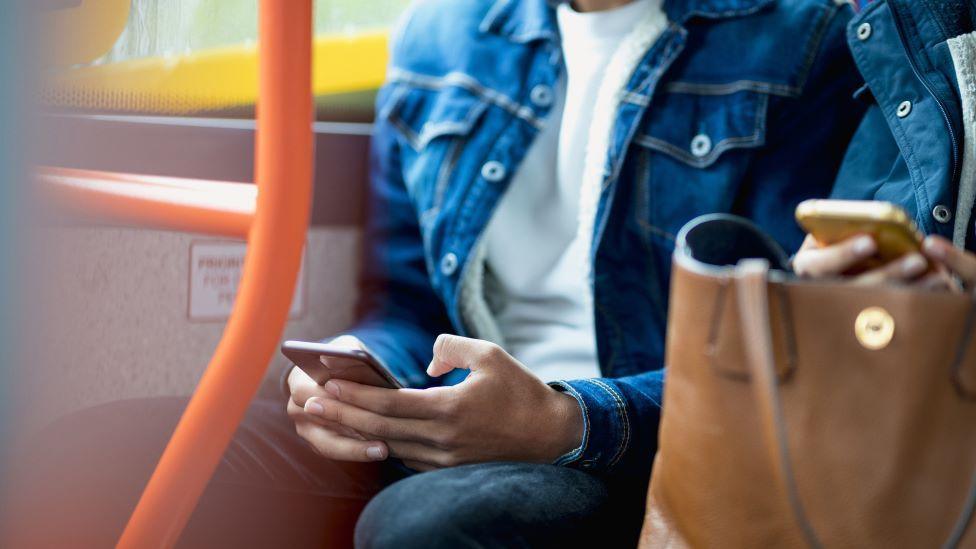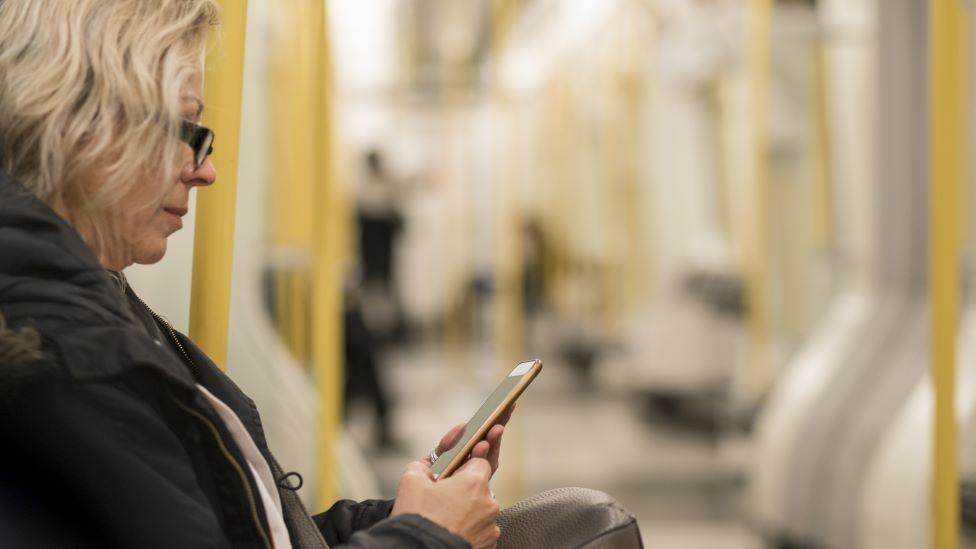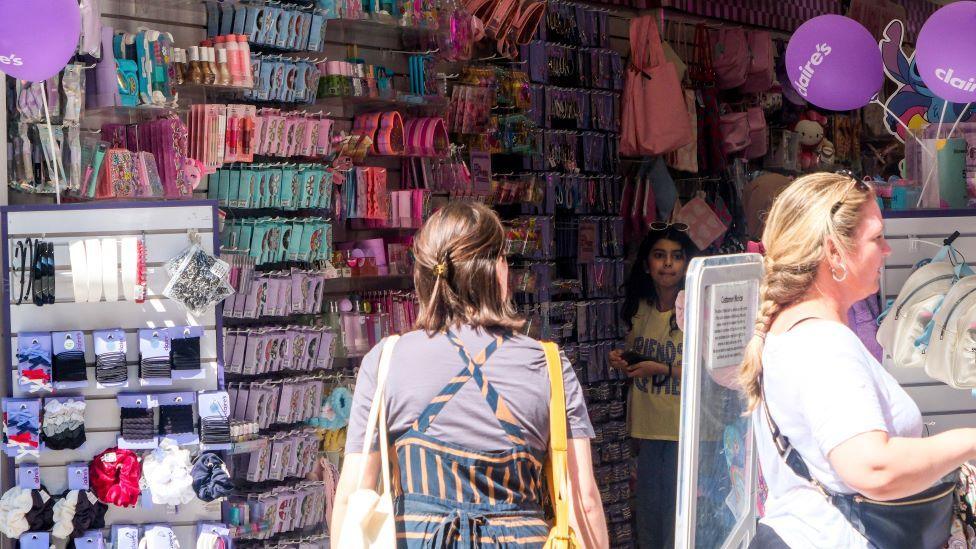I asked a bus passenger to turn his phone down - he called me miserable

Transport for London is urging passengers not to blast out videos and music on public transport
- Published
It's a sunny Saturday in August and the bus Rachel is driving in Sussex is nearly empty. There are just three passengers on the lower deck.
But despite how empty it is, the bus isn't quiet - because someone is watching rugby without headphones in.
When Rachel asks the passenger to turn his phone down because it's distracting her, he calls her "the most miserable bus driver I have come across in my entire life" and gets off the bus in a huff.
"He was [acting] like a little 10-year-old boy," says Rachel, whose name we've changed.
From blasting out music, TikTok videos and Instagram Reels, to having video calls on speaker phone, some people on public transport in the UK say they're getting fed up of noisy passengers.
In an August survey of 2,015 Britons, by the research and consultancy non-profit More In Common, 93% said they didn't think it was acceptable to play music out loud on a train.
It can be a pain for staff, too, with staff at Northern Rail listing, external it as one of the worst passenger habits.
Transport for London (TfL) is now trying to push back against this behaviour with posters on buses and the Tube urging passengers to use headphones when listening to music or videos.
The BBC spoke to passengers on public transport about their experiences with noisy neighbours - and whether they think displaying posters goes far enough.
Alessia Forzinetti and her two children take buses nearly every day to travel around Kingston upon Thames during the summer holidays.
She reckons that every journey she takes has had at least one person blasting out sound from their phone.
"This happens every time," the 43-year-old says, calling it "really, really annoying".
Frustrated with the noise, Alessia says she's sometimes resorted to getting off the bus and waiting for the next one - in particular when people are listening to music with explicit lyrics and she's travelling with her children.
She wouldn't feel confident asking them to turn the sound down, she says.
It is "very, very disturbing" when people take loud phone calls on the bus, adds Sayanti Dutta, 42.
"Sometimes it's quite embarrassing to listen to somebody's private conversation, with all their personal details," she says.
"I wish I could not hear it, but in such a confined space it is next to impossible not to hear it."

Sayanti says it's "embarrassing" to overhear to people's private calls on the bus
This includes a recent bus journey where Sayanti heard a passenger complaining in detail about her mother-in-law.
"A little consideration can go a long way," she says.
Sometimes other people's music is so loud on buses and trains that Kathleen Walsh, in Greater Manchester, can hear it through her own headphones.
"It just drives me round the bend" when people blast out videos, music and films on public transport, the 73-year-old says.
One bugbear for her is when parents bring a phone or other device for their children "and they have it on full whack", she says.
There is already some legislation aimed at preventing noisy behaviour. This includes a byelaw for railways, external in England, Wales and Scotland and for TfL, external services prohibiting people from blaring out loud sounds from a phone on trains and the Tube.
There are also regulations, external in England, Wales and Scotland allowing drivers and police officers to remove a passenger from a bus or coach for making a noise that causes "annoyance" to other passengers.
A TfL spokesperson tells the BBC that passengers who refuse to comply with staff and breach the byelaws, or bus and coach regulations, can be prosecuted and fined up to £1,000.
"Usually the customer complies, but if this fails, enforcement officers can deny travel, remove them from the network and/or refer them for prosecution," the spokesperson says.
In 2024, no passengers were prosecuted under the TfL byelaw on its network.

Passengers say they get annoyed by people who blast music and videos on public transport
Other transport operators discourage noisy passengers on their services.
Transport for Greater Manchester says staff on the Bee Network of trams and buses would challenge passengers with loud phones if necessary, while Merseyrail says that British Transport Police officers are available for help if a situation escalates, "though this is extremely rare in relation to noise complaints".
Some train operators like Avanti West Coast, Great Western Railway and LNER have dedicated quiet carriages, too.
Rachel, the bus driver, says noisy behaviour can be highly disruptive when she's driving.
"There's enough going on in front of me," she says. "That's what I need to be concentrating on, not on what's happening behind me inside the bus."
"I also work on the basis that if it's annoying me then it must be annoying everyone else," she adds.
So why do people do it?
This kind of behaviour has "become normalised", Rachel says, with people using phones "as a speaker".
"It's just so, so obnoxious," says Connor James, who lives in east London and listens to music on public transport - but always has headphones in.
He thinks the problem is worse in cities, where "you disassociate yourself" and might not worry as much about disturbing fellow passengers.
"Maybe they don't have as much self-awareness," the 32-year-old adds.

Connor thinks passengers pay less attention to the people around them in cities
Will putting posters up be enough?
Posters urging passengers to use headphones are now being added to the Elizabeth line and will appear across other TfL services from the autumn.
It's taken a similar approach with its campaign against sexual harassment, with posters about behaviours like staring, touching and cat-calling being added to TfL's network in 2021.
Other transport operators are also thinking about how they tackle this kind of behaviour on their own networks.
C2C, which operates trains in the East of England, says it "welcome[s] discussions around improving passenger etiquette and reducing disruptive behaviour".
Meanwhile, Transport for Wales says it is "implementing new customer messaging to promote respectful and mindful behaviour".
Brighton & Hove Buses also says it's reviewing "how we encourage passengers to be more considerate to others when travelling on our buses".
Passengers told the BBC they welcome the decision to add posters about nuisance noise.
But some are sceptical that the posters and corresponding social media campaign will be enough to change people's behaviour.
Rachel agrees and says passengers often don't feel comfortable asking other people to turn their sound down. She thinks more staff are needed on public transport instead, to reprimand noisy passengers.
"I don't think the people that do this feel any guilt and responsibility," Rachel says.
Related topics
More weekend picks
- Published30 August


